
Madam C.J. Walker's - Wooton Desk

Madam C.J. Walker's - Wooton Desk |
Shoportunity(Revised 06/24/2019) |
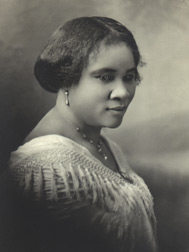 |
Sarah Breedlove, who later became known as Madam C. J. Walker, was born into a slave family to parents Owen and Minerva Breedlove. She had one older sister, Louvenia. Her parents were slaves on Robert W. Burney's Madison Parish farm which was a battle-staging area during the Civil War for General Ulysses S. Grant and his Union troops.
|
They had a daughter, Lelia (later known as A'Lelia Walker, a central figure in the Harlem Renaissance). When Lelia was only two years old, McWilliams died. Sarah's second marriage to John Davis August 11, 1894 failed and ended sometime in 1903. She married for the third time in January, 1906 to newspaper sales agent, Charles Joseph Walker; they divorced around 1910. |
Madam Walker was an entrepreneur who built her empire developing hair products for black women. She claims to have built her company on an actual dream where a large black man appeared to her and gave her a formula for curing baldness. When confronted with the idea that she was trying to conform black women's hair to that of whites, she stressed that her products were simply an attempt to help black women take proper care of their hair and promote its growth. |
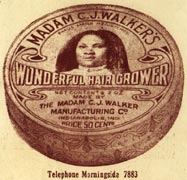 |
Madam Walker was quite the business woman. Her third husband, Charles Joseph Walker and her daughter Lelia had key roles in the growth and day-to-day operations of the business. In September, 1906 Madam Walker and her husband toured the country promoting their products and training sales agents while Lelia ran a mail-order operation from Denver. From 1908 to 1910 they operated a beauty training school, the Lelia College for Walker Hair Culturists, in Pittsburgh. In 1910 they moved the central operations to Indianapolis, then the country's largest manufacturing base, to utilize that city's access to eight major railway systems. At this height of success, Madam Walker gathered a group of key principals to run the company, and she and her husband divorced. |
She became an inspiration to many black women. Fully recognizing the power of her wealth and success she lectured to promote her business which in turn empowered other women in business. She gave lectures on black issues at conventions sponsored by powerful black institutions. She also encouraged black Americans to support the cause of World War I and worked to have black veterans granted full respect. |
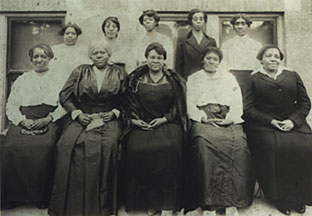 |
After the bloody East St. Louis Race Riot of 1917, Madam Walker devoted herself to having lynching made a federal crime. In 1918 she was the keynote speaker at many National Association for the Advancement of Colored People (NAACP) fund raisers for the anti-lynching effort throughout the Midwest and East. She was honored later that summer by the National Association of Colored Women (NACW) for making the largest contribution to saving the home of abolitionist Frederick Douglass. She donated large sums of money to the NAACP's anti-lynching campaign and later in her life revised her will to support black schools, organizations, individuals, orphanages, retirement homes, as well as YWCAs and YMCAs. |
Madam Walker's home, Villa Lewaro, was built in August of 1918 on Irvington-on-Hudson, New York. Her neighbors included industrialists Jay Gould and John D. Rockefeller. The grand estate served not only as her home but as a conference center for summits of race leaders to discuss current issues. |
Madam Walker died at Villa Lewaro at the age of 51 on Sunday, May 25, 1919 from complications of hypertension. Upon her death she was considered to be the wealthiest African-American woman in America and known to be the first African-American woman millionaire. Some sources cite her as the first self-made American woman millionaire. Her daughter Lelia succeeded her as president of the C. J. Walker Manufacturing Company. |
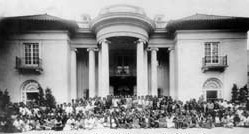 |
Villa Lewaro passed to her daughter, A'Lelia Walker who honored her mother's request and on her death in August 1931, bequeathed the mansion to the NAACP. The Villa Lewaro furnishings were sold at public auction. Madam Walker's personal bedroom items, including her cloths, her clothing armoire, her bed and personal Wooton desk were withheld from this sale. An unpaid mortgage kept the NAACP from accepting the gift and the residence was sold in early 1932 for a Depression-imposed $47,500. Villa Lewaro became a retirement home for the Companions of the Forest of America, a women's benevolent organization with no black members. Little attention was paid to the mansion until a group of black preservationists lobbied to have it listed in the National Register of Historic Places during America's bicentennial in 1976. Then in 1985, as members of the Companions began to die, Villa Lewaro went back on the market and its contents were sold at public auction. |
Included in the contents of Madam Walker's home was her esteemed personal desk, a Wooton Patent Secretary Desk. The Wooton Desk was officially called the "Wooton Patent Cabinet Office Secretary" and came into being when the US Patent Office issued patent number 155,604 to William S. Wooton on October 6, 1874. The Wooton Desk quickly became the embodiment of the phenomenon of conspicuous consumption which swept over moneyed society in the United States at the end of the 19th and the beginning of the 20th century. |
John D. Rockefeller, the Standard Oil Magnate was an early purchaser of a Wooton. The Wooton owned by Ulysses S. Grant, 18th President of the US is housed in the Smithsonian Institution. Other Wooton Desks were owned by G.B. Grinnell, founder of Iowa's Grinnell College; Sidney Lanier, poet; Joseph Pulitzer and Charles Scribner, publishers; Jay Gould, railroad magnate; and Governor Larrabee of Iowa. It is not known when Madam Walker purchased her Wooton Desk but in owning a Wooton, she joined an elite group, possibly becoming the first woman to own a Wooton. |
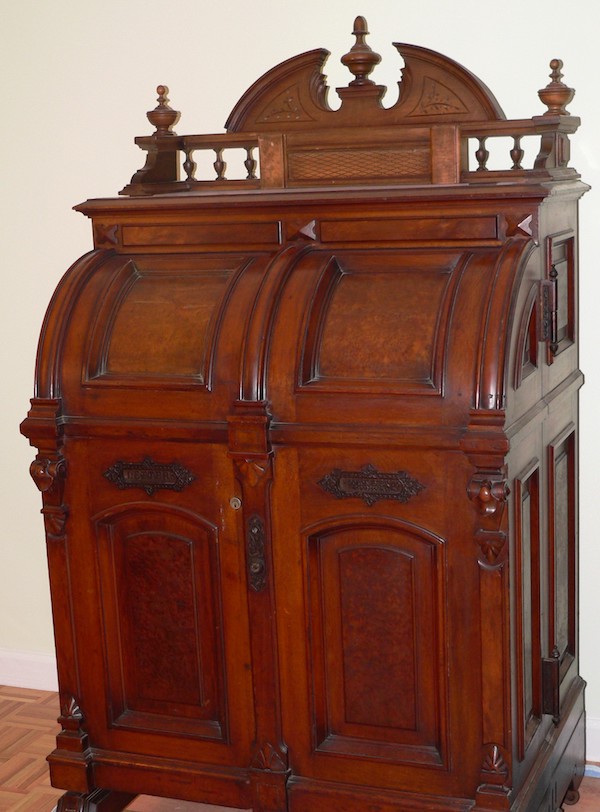
|
Madam Walker's Wooten Desk was purchased at auction
on the front steps of the Villa Lewaro. It has been continuously maintained under humidity
controlled air conditioned space to the present.
|
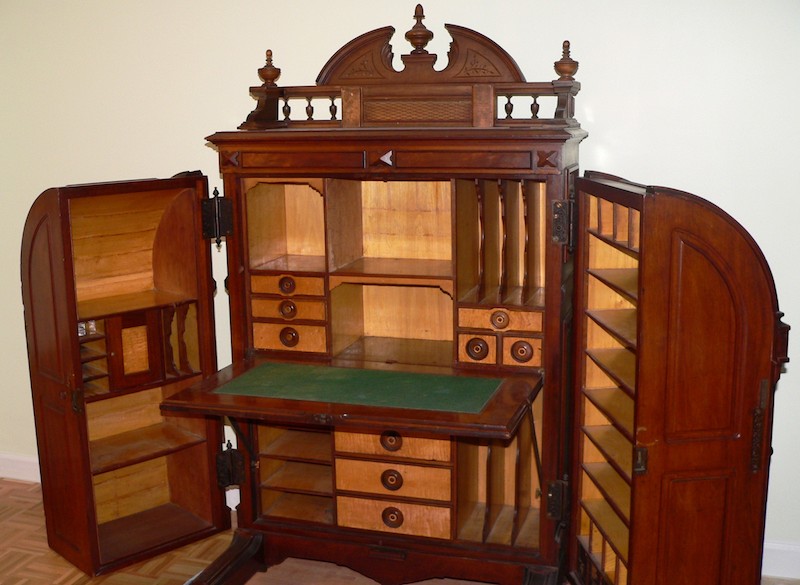
|
 |